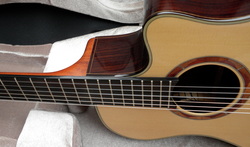
And now more rambling.
If there is one, single thing that you can do to improve the sound of ANY guitar, it is - change the strings. I'm constantly amazed by very, very expensive guitars in many music stores that sound like dog doo. In defense of the stores, the larger the store (and you see/hear it in the Guitar Center stores all the time), the more people will handle the instruments and the quicker the strings will go dead. Dead, thuddy, lifeless strings will kill the sound of just about any guitar but in a store you must remember that strings are expensive to replace, both in terms of the strings themselves and the employee time it takes to make the changes. So this is most likely why dead strings stay on guitars in stores. Or maybe they're just being cheap or not paying attention to their merchandise, I don't know.
Some guitarists are lucky. Their hands don't sweat and moisture and the grime and corrosion is encourages are not a problem. Most people are not that lucky though. A friend of mine has such sweaty hands that, as much as I like him and respect his musical abilities, I will not let him play my guitars. He can kill a set of strings in five minutes of playing, no lie.
I fall somewhere in the middle as I'm sure most guitarists do. If the weather isn't too hot and humid I can get a couple hours before I hear any difference in tone. Then there is a gradual loss of resonance and after a couple months I will change them. My Martin 0000-28H is a fabulous sounding guitar and I want it to sound the best it can, for as long as possible, factoring in the reality that I am admittedly a bit um... frugal... OK, cheap, and it breaks my tight Yankee heart to throw money away.
Which strings to buy? Which gauge? Which material (brass or phosphor bronze)? Which maker? Well, I'll tell you this. I've tried dozens of brands and I alternate between brass and phosphor bronze. Gauge-wise, these days I'm using what are essentially a hybrid, called by most maker light/medium or "custom light." The conundrum of gauges is not easy. For many years is used D'Addario J-16s, and still do from time to time. This is a reasonably priced string set, phosphor bronze, and they last reasonably well. Most people use light gauge strings because they are easier to press down than mediums, which is a fact.
However, light gauge strings don't put as much pressure on the bridge of the guitar as mediums, which in turn makes for less vibration and movement of the top and less volume and resonance. For many years when I was playing with fiddler Marie Rhines and I had to bang out rhythm stuff to accompany her fiddle I used mediums but at that time I was playing a Martin D-28, a model not usually known for its treble end anyway, and I found I had to "over play" finger picked tunes to get a decent treble sound. Plus they hurt like heck after a couple hours!
So I stuck with lights for many years but a couple years ago discovered those light/mediums. They are, for me at least, a great compromise between the play-ability of lights and increased volume, sustain and resonance of mediums. Presently I am using light/medium Newtone Master Class strings, alternating between their brass and phosphor bronze. The brass seems to have a brighter sound, which I like from time to time. These are hand-made strings - whatever the heck that means - from England and are expensive, in the order of 2 1/2 times the cost of the D'Addarios. But they last a long time and they are supposedly a slightly lower tension string, which makes them less fatiguing. I have found this to be true.
I hesitate to say however that these are the "best" strings. You just have to do as I did - experiment with a few different brands and gauges. Some people absolutely love the new coated strings by various manufacturers. These string have some sort of micro plastic coating that is supposed to repel moisture and stay cleaner, longer - thereby giving you that new string sound for a long, long time. I tried them and didn't care for them. Perhaps it was my own physical chemistry but each brand I tried sounded very squeaky and just too bright. But many people swear by them so they are probably worth a try. In fact some guitar companies - Taylor in particular - outfit all their new guitars with this type of string (I think they use the Elixer brand) to offset that problem I cited at the beginning - dead strings on guitars in music stores.
Bottom line - it doesn't matter which string you use, just don't be penny wise and dollar foolish. You paid good money for that guitar. Let it sound as good as it can. Change those strings often!
 RSS Feed
RSS Feed